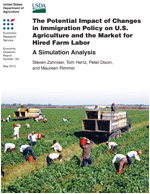The Potential Impact of Changes in Immigration Policy on U.S. Agriculture and the Market for Hired Farm Labor: A Simulation Analysis
- by Steven Zahniser, Thomas Hertz, Maureen T. Rimmer and Peter B. Dixon
- 5/22/2012
Overview
Large shifts in the supply of foreign-born, hired farm labor resulting from substantial changes in U.S. immigration laws or policies could have significant economic implications. A computable general equilibrium (CGE) model of the U.S. economy is used to evaluate how changes in the supply of foreign-born labor might affect all sectors of the economy, including agriculture. Two scenarios are considered: an increase in the number of temporary nonimmigrant, foreign-born farmworkers, such as those admitted under the H-2A Temporary Agricultural Program, and a decrease in the number of unauthorized workers in all sectors of the economy. Longrun economic outcomes for agricultural output and exports, wages and employment levels, and national income accruing to U.S.-born and foreign-born, permanent resident workers in these two scenarios are compared with a base forecast reflecting current immigration laws and policies.
Download
-
Entire report
Download PDF -
Report summary
Download PDF -
Download ERR135.zip
Download ZIP
We’d welcome your feedback!
Would you be willing to answer a few quick questions about your experience?

